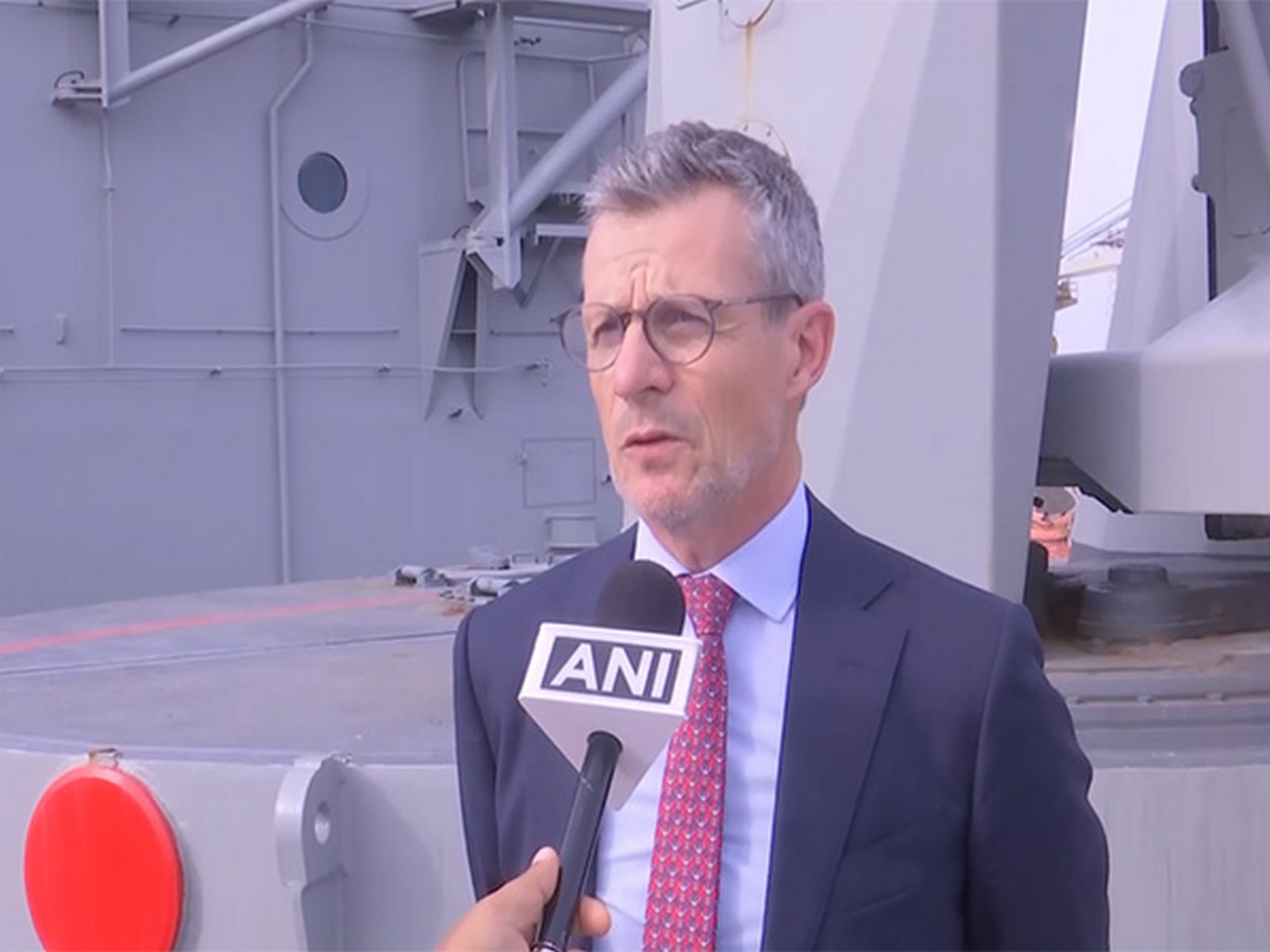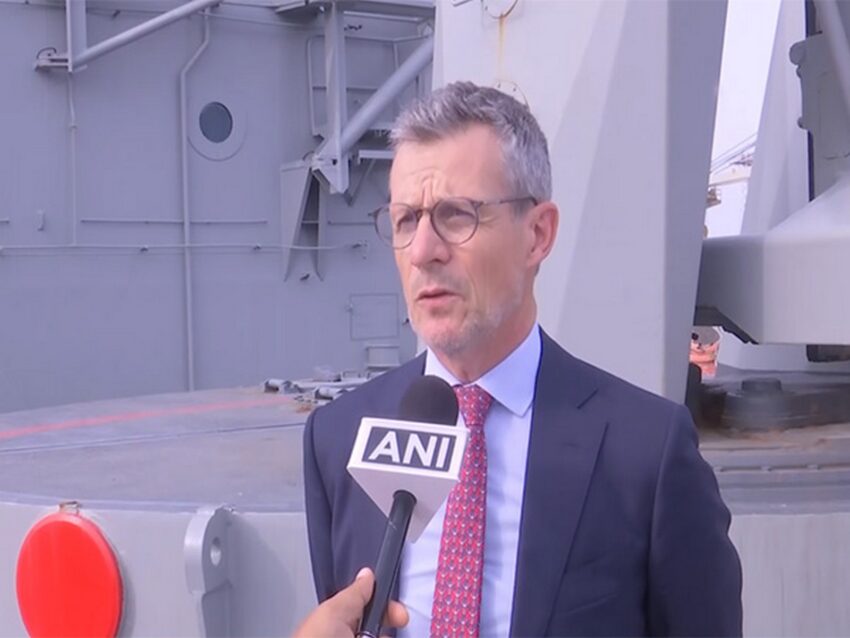
New Delhi [India], September 29 (ANI): The EU’s Ambassador to India, Herve Delphin, stated that the India-EU relationship has reached a pivotal moment, with both sides poised to elevate their strategic ties to the next level in his keynote address at the launch of Issue 5 of India’s World Magazine, titled “Cultivating Europe: Navigating India-EU Strategic Ties.”
The event, hosted in partnership with the Heinrich Boll Stiftung, explored the trajectory of India-Europe relations against a backdrop of global disorder, shifting alliances and a rapidly evolving Indo-Pacific.
Delphin highlighted the alignment of planets, symbolising the dynamics of the India-EU relationship. He noted that the recent visit of the European Commission President to Delhi and the release of a landmark political document on the EU-India Strategic Agenda demonstrate the EU’s commitment to deepening ties with India.
“When President von der Leyen met with Prime Minister Modi on the occasion of the unprecedented visit of the College of the European Commission to Delhi last February, she told him: ‘the Planets are aligned.’ She was not only referring to a rare phenomenon of alignment of seven planets of our solar system that took place on that very day, 28 February 2025. She was using this fitting image to characterize the dynamics of the relationship between the European Union and India.”
The key areas of cooperation include a Joint Communication that proposes an ambitious and concrete framework for the India-EU Strategic Agenda, focusing on five pillars: prosperity and sustainability, technology and innovation, security and defence, connectivity and global issues and enablers for partnership.
“This release was indeed to coincide with the planned release of a landmark political document on the EU side: the Joint Communication of the Commission and High Representative Kallas to the Council and European Parliament on a new EU-India Strategic Agenda. And as a feat of sheer coincidence or fortune, some might say the Joint Communication was published on 17 September, which is, as you all know, the birthday of Prime Minister Modi,” said Delphin.
He noted that the proposals include innovation hubs, Blue Valleys, a TTC 0.2 focused on supply chains, a gateway office for skilled ICT workers and a security and defence partnership for industrial cooperation.
“At the core, the Joint Communication proposes nothing more than greater connection and integration of our ecosystems. It is not a short-term hedging. It is a long-term investment. This is the EU’s concrete and ambitious offer.”
Delphin emphasised the political backing on both sides.
“The reference to India as a priority in the Political guidelines for the New Commission presented in July 2024 by President von der Leyen was an important signal that only a few picked up. The visit to Delhi by the President with the College of Commissioners last February, and the recent visit of the EU Ambassadors to the Political & Security Committee earlier in September, were further clear indications that the EU literally ‘walks its talk.’ They are a powerful political message of confidence and readiness from the EU side to engage.”
He stressed that leaders on both sides were aligned, noting Prime Minister Modi’s reference to the EU and India as “natural strategic partners.”
He highlighted the growing maturity of dialogues, convergence of global aspirations and the shared scale of influence.
“EU and India together represent close to 25% of world GDP, 25% of world population. The EU is India’s biggest trading partner in goods; we both stand as cooperative global actors committed to rules-based approaches and rules-based order.”
Delphin further emphasised the importance of having the capacity to act.
“The current joint roadmap 2020-2025 represents a list of 118 actions. Both sides agree that the completion rate exceeds 80%. However, there were probably too many actions, not all of which were necessarily formulated in terms of real deliverables. Now the strategic case is clear. We must deliver.”
He added that delivery must include finalising the FTA by the end of the year and negotiating a new EU-India Strategic Roadmap for endorsement at the next summit in Delhi in 2026.
He underscored the importance of stronger institutional governance, whole-of-system mobilisation and greater involvement of businesses, experts and think tanks.
“Creating more familiarity is critical to update knowledge and develop mutual understanding: like EU stance on China, which is still not fully appraised in India; or India’s engagement with the Global South, and mini-laterals such as BRICS or the SCO. I therefore salute India’s World initiative with this issue dedicated to Europe and the EU-India. I also thank all Indian Experts and think tankers – some of whom are in this hall today – who study EU-India relations and help shed light on the opportunities, strengths, risks and limits.”
Delphin pointed out that the relaunch of FTA negotiations and the setting up of the Trade and Technology Council were part of the EU’s reassessment.
He noted that while Europe was not always prominent on India’s strategic horizon, the EU’s posture of strategic autonomy had shifted perceptions in Delhi.
“In short, circumstances of necessity to de-risk, to hedge by diversifying partnerships and affirmation of greater strategic autonomy certainly provide a strong impetus for deepening our strategic ties.”
He said that by working together, India and the EU can harness their complementary strengths and assets to create a truly transformative partnership.
Delphin said, “I am certainly more familiar with geopolitics than cosmology or eschatology, but on every account, it would seem as if the EU and India have a ‘tryst with destiny.’ A common destiny. This inevitably invites a serious examination: To what extent are we, on both sides, ready to seize this historical moment and engage in deeper strategic ties? What are the key elements of the strategic equation we must square to transform a latent potential into a lasting reality? My address today will visit some of these key terms of this strategic equation posed to EU and India Circumstances, Vision, Will and eventually Capacity – and how they can turn it into a winning formula.”
On the question of circumstances, he noted that global power politics, technological races, and declining multilateralism have created common challenges.
“At the core, they face similar challenges: their economic development and their security are under stress; their vision of a rule-based and cooperative global order is undermined.”
Citing von der Leyen’s keynote in Delhi, he recalled her words: “This world is fraught with danger. But I believe this modern version of great power competition is an opportunity for Europe and India to re-imagine their partnership. In many ways, the EU and India are uniquely placed to respond to this challenge together.”
Delphin acknowledged the challenges in the relationship, including differences on issues like Russia’s war in Ukraine and economic coercion. However, he emphasized the importance of sensitivity and respect in navigating these differences.
“Let’s be clear: there is a Russia question. Ending the war in Ukraine with Russia genuinely engaging in a cease-fire and peace talks is certainly what everybody wants. However, it appears that President Putin has differing views. India has pronounced itself for peace. Russia is a strategic partner for India. India also aims to strengthen its ties with the EU. This will require further consideration in Delhi on how to square those terms.”
He added, “It is time, though, for India to stop seeing Europe through the eyes of Russia, as it has since Independence. While Delhi must maintain a productive relationship with Moscow, it also needs to balance its ties with Brussels and Moscow. The rapidly rising stakes in India’s relationship with the European Union require such a recalibration.”
On democracy and human rights, he said, “When it comes to questions of democracy and human rights, Europe and India are what they are because of their belief in democracy, human rights, individual dignity and equality, putting people at the centre. We both enjoy rich cultures, the multifaceted civilisational expression of our diversity: Both unique and diverse; and both united in our own diversity. These shared values are admittedly under threat. We should cultivate them, both for our own sake and for our common good.”
Concluding his remarks, Delphin said, “The degree of strategic convergence between the EU and India has never been greater, driven by: Convergence of our geopolitical, economic and security interests. Complementarity of our respective needs and assets. Scale of what we can offer to each other. Will of our leaders. The trust and thrust in our relationship can take it to a new strategic level, a truly transformative partnership pact. This is Brussels’ call to Delhi.” (ANI)


